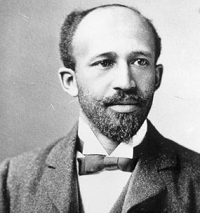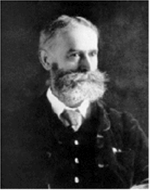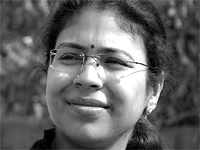Apr 24, 2024
Apr 24, 2024
by H.N. Bali
Continued from “Politics as Puppetry”
Many Faces of Falsehood − IV
 Over a century ago, W. E. B. Du Bois, the famous black sociologist and civil rights activist, developed in Strivings of the Negro People the concept of “double consciousness”of the black man: “One ever feels his two-ness, – an American, a Negro; two souls, two thoughts, two un-reconciled strivings.”
Over a century ago, W. E. B. Du Bois, the famous black sociologist and civil rights activist, developed in Strivings of the Negro People the concept of “double consciousness”of the black man: “One ever feels his two-ness, – an American, a Negro; two souls, two thoughts, two un-reconciled strivings.”
Isn’t a very similar two-ness also typical of Indians as a nation? After centuries’ of foreign domination by one invader after another, every Indian carries within his psyche the characteristics of acquiescence to be ruled over. Also, there’s in him, simultaneously, the Gandhi-inspired urge to assert his right to throw off the yoke of subjugation, and be free? These two un-reconciled selves have been struggling for dominance since Independence.
Two Selves at Work
The first assertive manifestation of the urge to be free to carve a place for ourselves as free people by throwing off the yoke of foreign dominance was in 1857 – generally referred to as the First War of Independence. Its failure led to a wide-spread acceptance of the rule of the rapacious Company Bahadur. How the British treated those who spearheaded the revolt is a dismal story that hasn’t as yet been fully told.
Of all the foreigners who ruled over us, the British were certainly the cleverest and the wiliest of the lot. They ruled and plundered India most deviously. Other invaders came and conquered parts of India and settled down to rule but also became sons of soil. The British ruled India through Indians and had no intention of settling down. At no given time between 1757 and 1947 there were more than a few hundred thousand Englishmen ruling over crores and crores of Indians. It were the chosen few ruling over the rest of us on behalf of the British. This unprecedented phenomenon was possible by introducing in our genetic system the Your Most Obedient Servant gene that predominates our mental make-up even after 65 years of Independence.
The year 1947 marks a landmark. It gave us an opportunity to start afresh. We adopted a constitution for our country which declared India a sovereign democratic republic. And this conferred on the hitherto-ruled Indians a new status of citizenship. But to play the new role expected of them, they must be well-informed. And that’s the role a free press plays in a democratic polity, which ours is supposed to be.
And what a dismal start did we make. We dissipated the opportunity and instead helped the ruling party to lay foundations of one-party rule which now is threatening to further degenerate into One Family rule supported by a network of regional feudal clans.
Did those hundreds of thousands who on Gandhi’s call sacrificed all they had bargain for this depressing scenario?
Role of Press
A democratic polity survives by the respect and loyalty it commands from its citizens. And one of the most powerful media at its command is the modern press with its massive reach. Let me underscore its importance by referring to a well-known historic episode.
No longer prepared to reconcile to the rampant corruption then prevalent in the Roman Church, Martin Luther on Halloween in 1517 nailed his 95 Theses of Contention to the Wittenberg Church door. Luther’s theses were by no means that radical as generally thought to be. In fact, similar thoughts had been debated several times over. And in several parts of Christendom! The really revolutionary attribute of Luther’s theses was, as Elizabeth Eisenstein points out in The Printing Revolution in Early Modern Europe, that the theses nailed by Luther, “did not stay tacked to the Church door”. Instead – and here lies their real revolutionary impact – they were reproduced at least three hundred thousand times by Gutenberg’s printing press. Who do you think should get the credit (or discredit?) for developments leading to the split of the Catholic monolith – Luther or the printing press that articulated in the minds of hundreds of thousands the feeling that they were vaguely conscious of?
This underscores the role that press has played in modern history.
In our times, media – print as well as electronic – has assumed power and influence which only a few decades ago was unimaginable. Gandhi wrote his column in Harijan every week. The readership of the weekly was a mere few thousand subscribers. But the national press printed it the next day and hundreds of thousands were inspired by it. That demonstrates the power of the press as an opinion-moulder.
Role of Media
The range and influence of media in our times has multiplied unimaginably over the last decade or so. All indicators show that. It will vastly increase further in the near future. However, their use as moulders of public opinion has never been so grossly abused as the last decade.
Media have – declaredly at least – three purposes to perform: to inform, to educate and to entertain. Informing per se means telling its readers as to what really happened without distorting facts.
 In a deservedly famous essay written in 1921 marking the Manchester Guardian's centenary (by when he had served nearly for half a century as its editor), C P Scott – the daily’s legendary editor, put down his opinions on the role of the newspaper. According to him, the “primary office” of a newspaper is accurate news reporting: in his classic words, “comment is free, but facts are sacred”. Even editorial comment, he pointed out, has its responsibilities: “It is well to be frank; it is even better to be fair”. A newspaper should have a “soul of its own”, with staff motivated by a “common ideal”. Don’t forget he was a Scot. So, he was deeply conscious of the business side of an enterprise. This, he emphasized, must be competent, but if it becomes the predominant purpose, the paper will face “distressing consequences”. Are you, really sure there will be Times of India around in another decade or two? Citizens Jains, as the New Yorker called the Jain brothers, might find more verdant pastures. Ultimately, they are only in the business of making money, which has its relentless rules that don’t admit any sense of purpose other than the paramountcy of the cash register.
In a deservedly famous essay written in 1921 marking the Manchester Guardian's centenary (by when he had served nearly for half a century as its editor), C P Scott – the daily’s legendary editor, put down his opinions on the role of the newspaper. According to him, the “primary office” of a newspaper is accurate news reporting: in his classic words, “comment is free, but facts are sacred”. Even editorial comment, he pointed out, has its responsibilities: “It is well to be frank; it is even better to be fair”. A newspaper should have a “soul of its own”, with staff motivated by a “common ideal”. Don’t forget he was a Scot. So, he was deeply conscious of the business side of an enterprise. This, he emphasized, must be competent, but if it becomes the predominant purpose, the paper will face “distressing consequences”. Are you, really sure there will be Times of India around in another decade or two? Citizens Jains, as the New Yorker called the Jain brothers, might find more verdant pastures. Ultimately, they are only in the business of making money, which has its relentless rules that don’t admit any sense of purpose other than the paramountcy of the cash register.
Let me illustrate it by two examples.
First, take the 2002 Gujarat communal riots which are, and will continue to be in the news till the 2014 elections are over. The bare, unvarnished facts are: 781 Muslims were killed among 1169 victims of the retaliatory communal clashes following Godhra train carnage in which 58 Hindu karsevaks were burnt alive. The coverage of the event by our secular press reported the Gujarat riots as the worst ever in India’s history when thousands of Muslims were killed by the communal cadres of BJP – that accursed political formation representing reactionary Hindu nationalism.
I’ve extensively dealt with blatant lie in the previous instalments in this series. Predominance of the business side of the operations of media has steadily and inexorably resulted in heavily biased reporting more in tune with the wishes and dictates of the sponsors. But is it factual? Is it fair? Can you really rely on what the media reports?
Secondly, let me take a very recent example still in the news almost every day.
 A young IAS Officer, Durga Shakti Nagpal, got posted as Sub-Divisional Magistrate in Gautam Buddha Nagar (NOIDA-UP) in September 2012. Her call of duty made her take stern action against the local illegal sand mining mafia that operates across a large swathe of western UP with strong political patronage. Her strong action antagonized the local Samajwadi Party MLA, Narendra Bhatty who also heads the UP State Agro Industrial Corporation Limited. Bhatty nurses political ambitions. After all, today, the most lucrative business in the country is politics. Any MP will attest that in the private. And the IAS officer appeared to be a hindrance. So, using his clout he gets Durga Shakti suspended that too in just 40 minutes! What can be more sinister, with far-reaching consequences to the basic tenets of governance? But the ruling SP dispensation would like it to be portrayed in communal overtones to show themselves as protectors of the minority community.
A young IAS Officer, Durga Shakti Nagpal, got posted as Sub-Divisional Magistrate in Gautam Buddha Nagar (NOIDA-UP) in September 2012. Her call of duty made her take stern action against the local illegal sand mining mafia that operates across a large swathe of western UP with strong political patronage. Her strong action antagonized the local Samajwadi Party MLA, Narendra Bhatty who also heads the UP State Agro Industrial Corporation Limited. Bhatty nurses political ambitions. After all, today, the most lucrative business in the country is politics. Any MP will attest that in the private. And the IAS officer appeared to be a hindrance. So, using his clout he gets Durga Shakti suspended that too in just 40 minutes! What can be more sinister, with far-reaching consequences to the basic tenets of governance? But the ruling SP dispensation would like it to be portrayed in communal overtones to show themselves as protectors of the minority community.
Doesn’t the media owe to the public to report the facts rather than the doctored version which the powers-that-be would like it to publicize.
The man who spent twenty-seven years of his life in prison for daring the apartheid minority white rule knew the ground reality. In Long Walk to Freedom, Nelson Mandela summed it up succinctly:
Newspapers are only a poor shadow of reality; their information.... discloses the biases and perceptions of both those who produce the paper and those who read it
Media management
The pestilences of our time are media manipulation and its close cousin public relations. In the commercial world, marketing and advertising are typically needed to make people aware of products. However, these techniques are no longer deployed in the commercial world alone. Media management is being deviously used to promote certain political policies and ideologies. And some of the techniques used by governments and parties/people with hidden agendas include:
Paying journalists to promote certain issues without the journalist acknowledging this, or without the media mentioning the sources;
Governments and individuals contracting PR firms to sell important issues of public concern, even a war
Disinformation or partial information reported as news or fact without attributing sources that might be questionable
PR firms feeding stories to the press without revealing the nature of the information with the intention of creating a public opinion.
The Gulf War in Iraq, 1991, for example highlighted a lot of PR work in action. The founder of the Washington PR firm, The Rendon Group, John Rendon reportedly told cadets at the U.S. Air Force Academy in 1996:
I am not a national security strategist or a military tactician. I am a politician, and a person who uses communication to meet public policy or corporate policy objectives. In fact, I am an information warrior and a perception manager.
At least the man is frank and also honest. With the bewildering increase in the popularity of the Internet, and search engines such as Google, smearing which so far was a threat, is taking on additional forms and techniques. Prof. Juan Cole, an American scholar and public intellectual, has coined a new term that has entered the lexicon of political debate, It is GoogleSmear.
Age of fakes
David Miller of Spinwatch has brought out in his commentary that today there’s not only a lot of fake news but it has been going on for a long time. Ours indeed is an age of fakes. We live in a time when the gap between how the world is and how powerful vested interests try to portray it, has grown dramatically wider than even before. Virtually, these days nothing in public debate is free of the virus of fakery.
Today, distortions such as the famous Stalinist airbrushing of Trotsky form photographs of Russian revolutionary years, can be far more easily contrived. The advent of the digital camera has made it infinitely easier, cheaper and faster to take and disseminate such fakes. You and I are getting used to watching artificially produced photographs inflating the size of crowds listening to George Bush or Sonia Gandhi addressing them. All this to convince us of their fake popularity!
And it is not merely photographs which lend themselves to such fake treatment at the hands of Governments. It has been brilliantly copied and improved upon by the cutting edge of innovation in the corporate sector. In the forefront are Monsanto and other in the field of Genetically Modified foods who are busy creating fake demonstrations, fake scientific institutes with illustrative paraphernalia of fake results, supported by fake experiments fed on websites. No wonder the new generation of fakes is far more sophisticated than the originals. So, the distinction between the fake and the real, never very easy, has become formidably difficult to discern.
In India we haven’t gone that far. Not as yet. But we seem to be heading in that direction. And pretty fast. Wait for 2014 elections to witness the progress. Meanwhile, those who still care about the future of this country will like to heed the following:
I am humble enough to admit that there is much that we can profitably assimilate from the West. Wisdom is no monopoly of one continent or one race. My resistance to Western civilization is really a resistance to its indiscriminate and thoughtless imitation based on the assumption that Asiatics are fit only to copy everything that comes from the West…. I do believe that if India has patience enough to go through the fire of suffering and to resist any unlawful encroachment upon her own civilization which, imperfect though it undoubtedly is, has hitherto stood the ravages of time, she can make a lasting contribution to the peace and solid progress of the world.
The author of this sane advice was Gandhi who wrote the above in Young India – the precursor of Harijan. That was way back on August 11, 1927 when the aping of the West was in its nascent state but found in the your most obedient servant gene a fertile field. Today, in supposedly independent India that “indiscriminate and thoughtless imitation” that Gandhi warned about is not a trickle: it is an avalanche. And, much to the delight of the dispensers of falsehoods.
10-Aug-2013
More by : H.N. Bali

|
"Two Selves at Work"! You are right on the mark with your diagnosis of the Indian Psyche in the post independence period. Being ruled over by others (particularly under "respectfully I beg to say" and "your most obedient servant" syndrome for centuries has altered our genes. We tend to put significantly higher weight on statements and views coming from foreigners than from within (I am not being critical of foreigners and their ability). Deep down, we know we have the ability but choose to become subservient. Understandably, we don't want to be ruled by the foreigners but our psyche is. This dichotomy creates turmoil within us when we work with each other. We become fiercely independent, are unwilling to compromise and fail to evolve any meaningful organization of governance. This has further evolved into lack of respect for our contemporaries, lack of concern for the country, selfishness and corruption. All our intelligence and academic excellence is either mis-directed or becomes counter-productive. Understanding of this disability and dealing with it is critical to our deliverance. |

|
1984! |